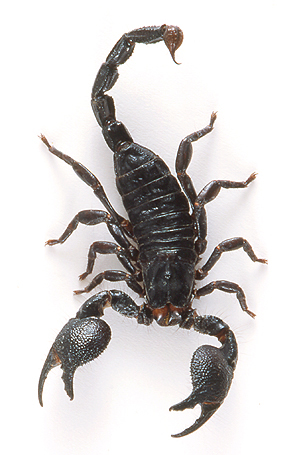Emperor Scorpion (Pandinus imperator)
Pricing: Dead (spread, as pictured): $50-$100 depending on size (dried, spread).
Geographic Range: Sub-Saharan West Africa
View: Top View
Size: Length: 20cm (body and tail)
Availability Notes: Dead specimens are casualties from the live-export trade and are not common.
Pandinus imperator is known as the Emperor Scorpion. It is probably the most common scorpion kept in captivity, most likely because it is very docile, as well as non-venomous. For some reason, Pandinus imperator is not very aggressive and tends to attack with it’s claws rather than it’s stinger. Because of this, if handled in a non-threatening manner it is possible to avoid provoking the scorpion. However, its claws are very powerful and it can pinch like a crab, so be careful. In order to avoid over-collecting due to its popularity as a pet, P. imperator is listed on CITES (list II) together with two other species of Pandinus. Luckily it is easy to keep and breed so captive-bred specimens are readily available. Specimens of P. imperator should be kept on a substrate of peat that is slightly moist. Keep it deep enough to allow for burrowing but also have a hollow log or other place for the scorpion to hide. Also keep a small, shallow water dish full of clean water. Keep the temperature about 80-90ºF with a high humidity. They can tolerate lower temperatures but they will be sluggish and won’t thrive. Although the nymphs grow slowly and can take several years to mature, the adults will live for many years. Nymphs should be fed small crickets while adults can be fed much larger prey, including baby mice and small lizards. It has been said that in the wild they are fond of millipedes. Native to Sub-Saharan west Africa, P. imperator has been collected from Senegal to Nigeria, south to the Republic of the Congo. P. imperator is nocturnal and hides during the day in a burrow. Subsociality has been reported in the wild for this species, with mothers and their offspring (or siblings) living together. This ability to coexist peacefully allows a keeper to house several specimens of P. imperator together in the same cage, as long as there is adequate space and food.
